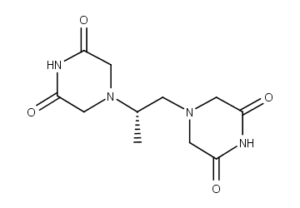Dexrazoxane HCl CAS NO 149003-01-0 Inquire about Dexrazoxane HCl
Tecoland supplies Dexrazoxane HCl bulk active pharmaceutical ingredient (API) to the pharmaceutical industry. Our Dexrazoxane HCl is manufactured by cGMP compliant facility. Welcome to contact us for further details including current DMF status for the product and up to date regulatory status of the manufacturing facility. We look forward to assisting you with your research and development projects.
What is Dexrazoxane?
Dexrazoxane hydrochloride (Zinecard by Pfizer in USA and Canada; Cardioxane by Novartis for EU and other countries) is a cardioprotective agent. It was discovered by Kurt Hellmann in 1972. Dexrazoxane has been used to protect the heart against the cardiotoxic side effects of chemotherapeutic drugs such as anthracyclines, such as daunorubicin or doxorubicin or other chemotherapeutic agents. However, in July 2011 the US Food and Drug Administration released a statement restricting use only in adult patients with cancer who have received > 300 mg/m2 doxorubicin (an anthracycline) or > 540 mg/m2 epirubicin (another chemotherapeutic agent) and general approval for use for cardioprotection that showed a possibly higher rate of secondary malignancies and acute myelogenous leukemia in pediatric patients treated for different cancers with both dexrazoxane and other chemotherapeutic agents that are associated with secondary malignancies.
The United States Food and Drug Administration has also approved a dexrazoxane hydrochloride drug, brand name Totect or Savene (developed by TopoTarget), for use as a treatment of extravasation resulting from IV anthracycline chemotherapy. Extravasation is an adverse event in which chemotherapies containing anthracylines leak out of the blood vessel and necrotize the surrounding tissue.
Mechanism
As a derivative of EDTA, dexrazoxane chelates iron and thus reduces the number of metal ions complexed with anthracycline and, consequently, decrease the formation of superoxide radicals. The exact chelation mechanism is unknown, but it has been postulated that dexrazoxane can be converted into ring-opened form intracellularly and interfere with iron-mediated free radical generation that is in part thought to be responsible for anthryacycline induced cadiomyopathy. It was speculated that dexrazoxane could be used for further investigation to synthesize new antimalarial drugs.
Disclaimer:
Information on this page is provided for general information purposes. You should not make a clinical treatment decision based on information contained in this page without consulting other references including the package insert of the drug, textbooks and where relevant, expert opinion. We cannot be held responsible for any errors you make in administering drugs mentioned on this page, nor for use of any erroneous information contained on this page.